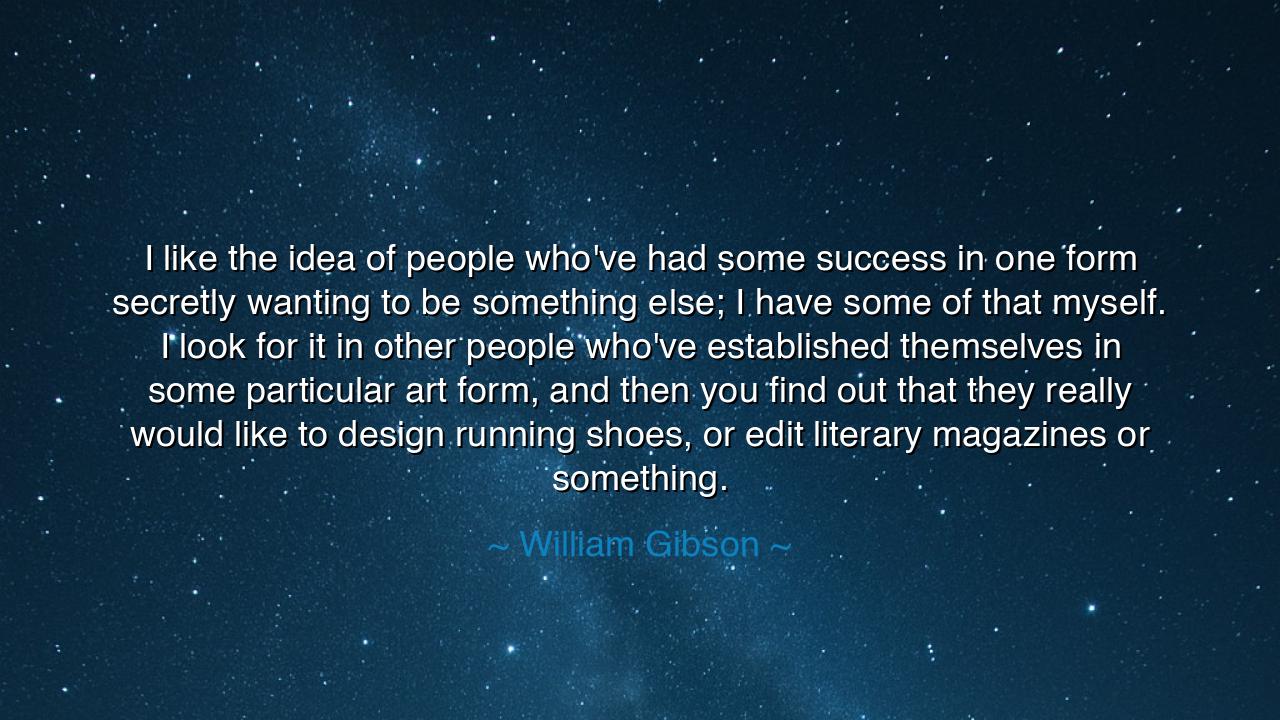
I like the idea of people who've had some success in one form
I like the idea of people who've had some success in one form secretly wanting to be something else; I have some of that myself. I look for it in other people who've established themselves in some particular art form, and then you find out that they really would like to design running shoes, or edit literary magazines or something.






“I like the idea of people who've had some success in one form secretly wanting to be something else; I have some of that myself. I look for it in other people who've established themselves in some particular art form, and then you find out that they really would like to design running shoes, or edit literary magazines or something.” Thus spoke William Gibson, the seer of the digital age, the poet of circuitry and imagination, whose words pierce beyond the world of art into the core of the human condition. In these lines, Gibson reveals a truth as old as creation itself: that within every soul lies the restless desire to transform, to wander beyond mastery into mystery, to break the bounds of success and chase the unknown once more.
At first glance, his words seem simple—a reflection on creative envy or curiosity. But beneath them lies something deeper, a meditation on the unquenchable nature of the human spirit. Those who have tasted the fruit of accomplishment know that its sweetness fades quickly. The artist who has built a name, the thinker who has carved a legacy—each, in time, begins to yearn for another form, another challenge, another incarnation of self. For man is not made to dwell in stillness. The same fire that drove him to create now whispers of new beginnings. And so, the sculptor dreams of composing music, the novelist longs to paint, the inventor imagines himself a poet. This restlessness is not vanity—it is the pulse of life seeking new expression.
William Gibson, himself a prophet of worlds both real and imagined, speaks from experience. Known as the father of cyberpunk, the architect of visions that shaped an era, he confesses here that even he, with all his triumphs, feels the pull toward something else. His art, though vast, cannot contain the entirety of his imagination. This is the mark of the true creator: never content, always searching, always haunted by the possibilities just beyond his reach. Gibson’s fascination with others who share this hunger is a recognition of kinship. He sees in them the eternal traveler—the soul who refuses to be defined by a single craft or title.
Such souls have walked through every age. Leonardo da Vinci, master of painting, anatomy, and invention, was never satisfied with one identity. His curiosity spilled beyond the canvas into machines, maps, and dreams of flight. He painted the Mona Lisa, yet longed to understand the movement of water and the flight of birds. The same man who gave us beauty also designed engines of war. This is the essence of Gibson’s insight—that true genius often refuses confinement. It is the desire for multiplicity, the urge to live many lives within one lifetime, that gives birth to greatness.
And yet, there is also a quiet melancholy in Gibson’s words. For the one who has succeeded may find himself trapped by his own achievement. The world, in its hunger for definition, often builds cages out of admiration. “You are this,” it says. “Stay here.” But the artist’s heart rebels. He dreams in secret of a different craft, one that the world does not expect from him. Gibson honors this secret longing. He calls it sacred, not shameful. To desire to be “something else” is not betrayal—it is renewal, the soul’s instinct to evolve.
This yearning also reminds us of the eternal truth that identity is not a destination, but a river. The self is not one thing, but many, flowing and merging, ever-changing. The wise do not fight this change—they honor it. They understand that creativity is not a monument, but a journey. As the old masters knew, to stop transforming is to die before death. The heart that no longer dreams of new forms becomes a relic. Thus, the artist must keep moving, must keep becoming, even when the world asks him to stay still.
So, my child of creation, take this teaching into your own heart. Do not fear the desire to be something else. When restlessness stirs within you, when new dreams call you away from what you have built, listen. It is not disloyalty—it is life speaking. Explore new crafts, learn new languages of expression, follow your curiosity wherever it leads. The sculptor may find wisdom in song, the engineer may find beauty in poetry, the scholar may discover truth in silence. For the spirit that dares to begin again is the spirit that remains forever young.
Thus remember the wisdom of William Gibson: success is not the end, but a doorway. Walk through it bravely, and do not cling to titles or forms. For the joy of creation lies not in arriving, but in becoming—in embracing the endless unfolding of the self. To dream of being “something else” is not to abandon what you are, but to honor the infinite potential within you. And in that eternal act of becoming, you join the lineage of all who have ever dared to create anew—the restless, the seekers, the makers of worlds.






AAdministratorAdministrator
Welcome, honored guests. Please leave a comment, we will respond soon